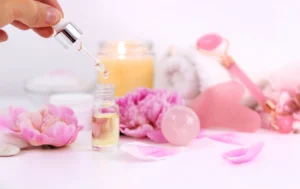Aromatherapy, the art and science of using natural oils and scents to enhance psychological and physical well-being, has been practiced for thousands of years. From the ancient Egyptians who used aromatic oils for spiritual and medicinal purposes to the modern-day wellness enthusiasts, aromatherapy has proven to be a powerful tool in enhancing mood and promoting overall wellness. In this blog, we’ll explore the various benefits of aromatherapy, how different fragrances impact our mood, and how you can incorporate aromatherapy into your daily routine.
What is Aromatherapy?
Aromatherapy involves the use of essential oils extracted from plants to improve mental and physical health. These oils are typically used in diffusers, added to bathwater, applied to the skin, or inhaled directly. The molecules in essential oils interact with the brain and nervous system in ways that can influence mood and health.
The Science Behind Aromatherapy
When you inhale essential oil molecules, they travel through your olfactory system to the limbic system, a part of the brain involved in emotions, behavior, and long-term memory. This is why certain scents can trigger memories or emotions. The limbic system also interacts with the hypothalamus, which regulates essential bodily functions like sleep, appetite, and stress levels. This interaction helps explain why aromatherapy can have such a profound impact on mood and well-being.

Benefits of Aromatherapy
1. Stress Relief
One of the most well-known benefits of aromatherapy is its ability to reduce stress. Essential oils like lavender, chamomile, and bergamot have calming properties that can help lower cortisol levels and promote relaxation. These oils can be diffused in your home or applied to the skin during a massage to help melt away stress.
2. Improved Sleep
Aromatherapy can also promote better sleep. Scents like lavender, sandalwood, and ylang-ylang are known for their sedative properties. Using these oils in a diffuser in your bedroom or adding a few drops to your pillow can help you fall asleep faster and enjoy a more restful night.
3. Enhanced Mood
Certain fragrances can boost your mood and increase feelings of happiness. Citrus scents like orange, lemon, and grapefruit are particularly effective at lifting spirits and providing an energy boost. These can be diffused during the day or used in a personal inhaler for a quick pick-me-up.

4. Pain Management
Essential oils such as peppermint, eucalyptus, and ginger can help alleviate pain and inflammation. These oils can be diluted with a carrier oil and applied directly to sore muscles and joints. Inhaling these scents can also provide relief from headaches and migraines.
5. Improved Cognitive Function
Some essential oils can enhance cognitive performance, including memory, concentration, and mental clarity. Rosemary, peppermint, and basil are known to stimulate the brain and improve focus. Diffusing these oils in your workspace or using them in a personal inhaler can help boost productivity.
How to Use Aromatherapy
Diffusion
Using an essential oil diffuser is one of the most popular ways to enjoy the benefits of aromatherapy. Add a few drops of your chosen essential oil to the diffuser with water, and it will disperse the scent throughout the room.
Topical Application
Essential oils can be applied directly to the skin when diluted with a carrier oil like coconut or jojoba oil. This method is excellent for targeted relief, such as massaging lavender oil onto your temples for headache relief or applying peppermint oil to sore muscles.
Inhalation
Inhaling essential oils directly from the bottle or using a personal inhaler is a quick and effective way to experience their benefits. This method is particularly useful for boosting mood or relieving stress on the go.
Bathing
Adding a few drops of essential oil to your bathwater can create a relaxing and therapeutic experience. Oils like lavender and chamomile are excellent choices for a calming bath before bedtime.

Upcoming Trends in Aromatherapy:
Personalized Aromatherapy
As technology advances, personalized aromatherapy experiences tailored to individual needs and preferences are expected to become more common. Smart diffusers that adjust scents based on real-time data like stress levels and sleep patterns are on the horizon.
Aromatherapy for Mental Health
With growing awareness of mental health issues, aromatherapy is likely to play a more significant role in managing conditions like anxiety and depression. Research is ongoing to develop blends specifically designed to support mental well-being.
Sustainable and Ethical Sourcing
Consumers are becoming more conscious of the environmental and ethical impact of their purchases. The demand for sustainably sourced and ethically produced essential oils is expected to rise, prompting companies to adopt more transparent and responsible practices.
Conclusion
Aromatherapy offers a wide range of benefits, from reducing stress and improving sleep to enhancing mood and cognitive function. By understanding how different scents impact your body and mind, you can harness the power of essential oils to promote overall wellness. With upcoming trends like personalized aromatherapy and a focus on mental health, the future of this ancient practice looks promising and innovative.
Whether you’re a seasoned user or new to aromatherapy, incorporating these natural scents into your daily routine can lead to a more balanced and harmonious life. So, why not start exploring the world of aromatherapy today and discover the scents that work best for you?
